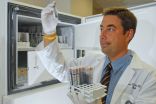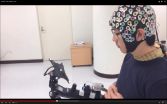(Press-News.org) INDIANAPOLIS -- People being treated for bipolar disorder and other psychiatric illnesses are at greater risk of attempting suicide, but physicians may now have tools to predict which of those individuals will attempt it and intervene early to prevent such tragedies from occurring.
Researchers at Indiana University School of Medicine reported Tuesday in the Nature Publishing Group's leading journal in psychiatry, Molecular Psychiatry, that they have developed blood tests and questionnaire instruments that can predict with more than 90 percent accuracy which of those patients will begin thinking of suicide, or attempt it.
"We believe that widespread adoption of risk prediction tests based on these findings during healthcare assessments will enable clinicians to intervene with lifestyle changes or treatments that can save lives," said Alexander B. Niculescu III, M.D., Ph.D., professor of psychiatry and medical neuroscience at the IU School of Medicine and attending psychiatrist and research and development investigator at the Richard L. Roudebush Veterans Affairs Medical Center.
Using RNA biomarkers from blood samples along with a newly developed questionnaires in the form of an app, the researchers were able to predict which individuals in a group of patients being seen for a variety of psychiatric illnesses would experience significant suicidal ideation with approximately 92 percent accuracy. Among patients with bipolar disorder, the accuracy reached 98 percent, Dr. Niculescu said. The combination of biomarkers and app was also accurate in predicting which of the patients would be hospitalized for suicidality in the year following testing (71 percent across all diagnoses, 94 percent for bipolar disorder).
The questionnaires by themselves, implemented as apps on tablets, were able to predict the onset of significant suicidal thoughts with more than 80 percent accuracy.
The research expands upon work reported by Dr. Niculescu and colleagues in 2013 in which they identified a panel of biomarkers that were significantly elevated in bipolar disorder patients with suicidal thoughts or who were hospitalized as a result of suicide attempts.
"We now have developed a better panel of biomarkers that are predictive across several psychiatric diagnoses. Combined with the apps, we have a broader spectrum predictor for suicidality," Dr. Niculescu said. "In additional to reproducing and expanding our own previous work, we reproduce and expand other groups' results in this burgeoning field."
The current study began with a group of 217 male psychiatric participants, followed by Dr. Niculescu and colleagues for several years with diagnoses of bipolar disorder, major depressive disorder, schizoaffective disorder, and schizophrenia. The researchers identified 37 participants who switched from no suicidal ideation to high suicidal ideation at different testing visits. The scientists were able to identify RNAs that were present at different levels in blood samples taken at those different testing visits, in common across these 37 individuals. Those candidate biomarkers were then evaluated using the Niculescu group's Convergent Functional Genomics approach, to prioritize the best markers.
Next, working with the Marion County (Indianapolis, Ind.) Coroner's Office, the researchers validated those prioritized biomarkers using blood samples from 26 men who had committed suicide.
Finally, the researchers used blood samples and medical records from a different group of patients with the same psychiatric diagnoses to confirm that the biomarkers and apps predicted suicidal ideation, and also examined their ability to predict future hospitalizations for suicidality in the first year following testing.
The app-based questionnaires were developed separately, said Dr. Niculescu, director of the Laboratory of Neurophenomics at the Institute of Psychiatric Research at the IU School of Medicine.
One of the apps assesses measures of mood and anxiety; the other asks questions related to life issues including physical and mental health, addictions, cultural factors and environmental stress. Neither app, he emphasized, asks whether the individual is thinking of committing suicide.
Dr. Niculescu said he believes the apps are ready to be deployed and tested by medical professionals, particularly in emergency department settings. The biomarkers could also be more widely tested for in the near future he said.
However, he noted two limitations that require additional research. First, all of the participants in this study were men. Studies in women are currently being conducted and are showing promising preliminary results. In addition, the research was based on work with people with psychiatric diagnoses. How well the biomarkers would work among people who have not been diagnosed with a psychiatric disease is not known.
INFORMATION:
Additional information about Dr. Niculescu's work is available at his laboratory website: http://www.neurophenomics.info.
Additional investigators contributing to the research were Daniel F. Levey, Peter L. Phalen, Helen Le-Niculescu, Helen D. Dainton, Nikita Jain, Dawn L. Graham, Robert Schweitzer, Thatcher B. Ladd, Rebecca Learman, EM Niculescu, Naga Prasuna Vanipenta, Farnoosh N. Khan, Jim Mullen, Ganesh Shankar, Anantha Shekhar, Mike Yard and George E. Sandusky of the IU School of Medicine; Elizabeth Belanger, Alison James, Sunita George and Holly Weber of the Roudebush VA Medical Center; Shannon Cook, Carolyn Humbert and Alfarena Ballew of the Marion County Coroner's Office; Terri Gelbart, Sunil M. Kurian and Daniel R. Salomon of the Scripps Research Institute, and Nicholas J. Schork of the J. Craig Venter Institute.
The research was supported by an NIH Directors' New Innovator Award (1DP2OD007363) and a VA Merit Award (2I01CX000139).
An unprecedented potential "molecular tweezer" called CLR01, reported in the journal eLife, not only blocks HIV and other sexually transmitted viruses, but also breaks up proteins in semen that boost infection.
Semen is the main vector for sexual HIV transmission. It contains proteins that assemble into very stable polymers called amyloid fibrils, which can enhance HIV infectivity by up to 10,000 times. Scientists led by the University of Pennsylvania (USA) and Ulm (Germany) now show that a molecule with the shape of a tweezer not only destroys HIV particles but also ...
A new study shown that meteorite impacts on ancient oceans may have created nucleobases and amino acids. Researchers from Tohoku University, National Institute for Materials Science and Hiroshima University discovered this after conducting impact experiments simulating a meteorite hitting an ancient ocean (Fig. 1).
With precise analysis of the products recovered after impacts, the team found the formation of nucleobases and amino acids from inorganic compounds. The research is reported this week in the journal Earth and Planetary Science Letters.
All the genetic information ...
Children with better academic and behavioral functioning when they start kindergarten often have better educational and societal opportunities as they grow up. For instance, children entering kindergarten with higher reading and math achievement are more likely to go to college, own homes, be married, and live in higher-income neighborhoods as adults. Now a new study points to very early roots of differences in school readiness, with growth in vocabulary playing a particularly important role. The study found that children with larger oral vocabularies by age 2 arrived at ...
Adolescents who have romantic relationships tend to have more problems with psychosocial adjustment. In contrast, young adults who have romantic relationships tend to have fewer problems with psychosocial adjustment. Although the links between having a romantic relationship and psychosocial adjustment change with age, a new longitudinal study has found that it's not just having a relationship that matters, but the quality of the relationship: Higher-quality romantic relationships are associated with fewer psychosocial difficulties across adolescence and young adulthood.
The ...
Scientists working at Korea University, Korea, and TU Berlin, Germany have developed a brain-computer control interface for a lower limb exoskeleton by decoding specific signals from within the user's brain.
Using an electroencephalogram (EEG) cap, the system allows users to move forwards, turn left and right, sit and stand simply by staring at one of five flickering light emitting diodes (LEDs).
The results are published today (Tuesday 18th August) in the Journal of Neural Engineering.
Each of the five LEDs flickers at a different frequency, and when the user focusses ...
A new test for offers the possibility of near real time monitoring of bone diseases, such as osteoporosis and multiple myeloma. The functionality of the test, which measures changes in calcium isotope ratios, has been validated on blood samples from NASA space shuttle astronauts.
Our bones are largely built of calcium, and the turnover of calcium can indicate the development of bone diseases such as osteoporosis and the cancer multiple myeloma. Geochemists have developed extremely accurate ways of measuring calcium isotope ratios, for example for the study of sea shell ...
For an embargoed PDF, please contact Cara Graeff or 215-351-2513 or Angela Collom or 215-351-2514.
1. Anonymous essay exposes scandalous doctor behavior
Free abstract: http://www.annals.org/article.aspx?doi=10.7326/M14-2168
Editorial: http://www.annals.org/article.aspx?doi=10.7326/M15-1144
URLs go live when embargo lifts
An anonymous and provocative essay published in Annals of Internal Medicine exposes the dark underbelly of medicine where doctors displayed stomach-churning disrespect for vulnerable patients. The author describes teaching a medical humanities ...
PHILADELPHIA - Websites for national and state health insurance marketplaces show evidence of improved efforts to assist patients in choosing health insurance plans, such as providing decision support tools, experts from the Perelman School of Medicine at the University of Pennsylvania have found. However, in a letter published in the August 18 issue the Annals of Internal Medicine, the Penn team recommends taking more steps to better support consumers in making informed health plan decisions.
The marketplaces, also called health exchanges, were established by the Patient ...
Research has shown that a regular dose of aspirin reduces the long-term risk of cancer in those who are overweight in an international study of people with a family history of the disease.
The study, conducted by researchers at Newcastle University and the University of Leeds, UK, is published today in the Journal of Clinical Oncology.
They found that being overweight more than doubles the risk of bowel cancer in people with Lynch Syndrome, an inherited genetic disorder which affects genes responsible for detecting and repairing damage in the DNA. Around half of these ...
Testing for genetic risk factors could improve treatment for myeloma - a cancer of the blood and bone marrow - by helping doctors identify patients at risk of developing more aggressive disease.
New research, published in the Journal of Clinical Oncology today (Monday), found as few as nine genetic features would need to be tested to identify high-risk patients who might benefit from intensive treatment.
The study, led by researchers at The Institute of Cancer Research, London, is the first to link genetic mutations in myeloma cells to the chances of surviving the disease.
The ...


